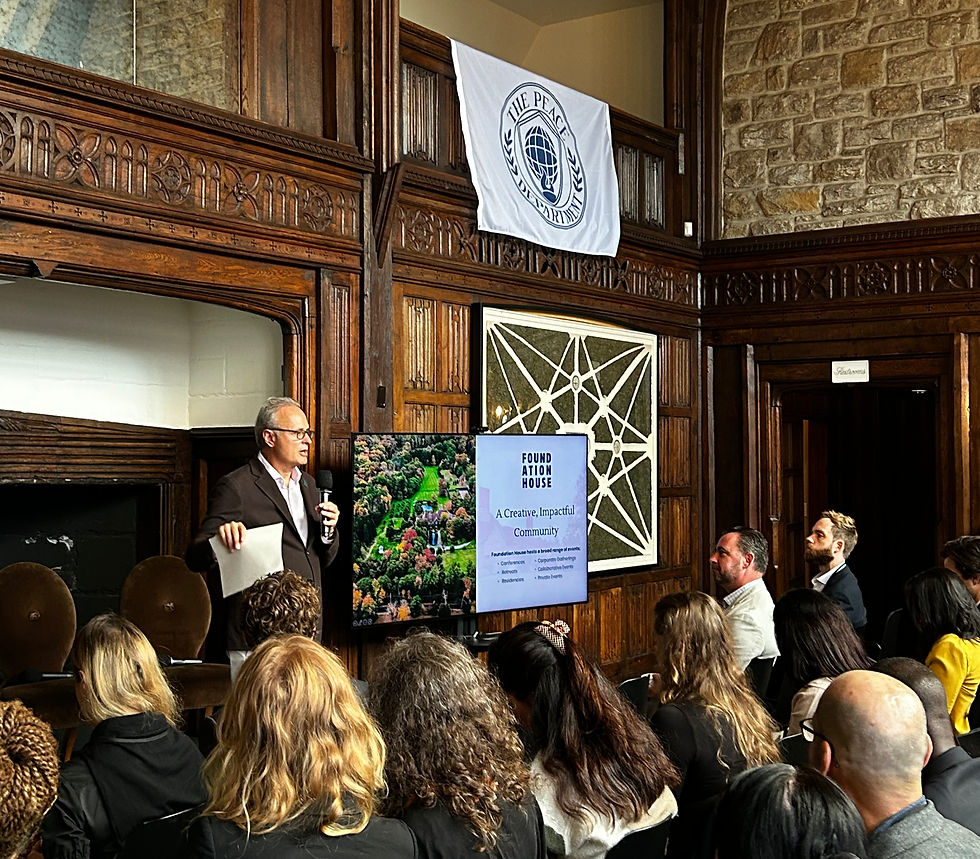Connecticut Food System Transformation: Pathways To Equity & Resilience
- Foundation House

- May 3, 2024
- 3 min read
Updated: May 7, 2024
FOUNDATION HOUSE FORUM
Connecticut Food System Transformation: Pathways To Equity & Resilience
April 26, 2024
INTRODUCTION
Foundation House, in partnership with The Foodshed Network, hosted an engaging discussion on food system transformation in Connecticut, exploring community-based initiatives as pathways toward a more just, resilient, and regenerative food system in the state. Attendees included community organizers, farmers, food policy experts, farmland advocates, bridge builders, and food system and changemakers. Also in attendance were Impact investors, philanthropists, entrepreneurs and interested local citizens.
Keynote:
Ali Ghiorse: Co-founder, Foodshed Forum
Panel #1 Farmland Access + Resilience:
Richard Zimmerman: Executive Director, Foundation House (Moderator)
Denise Savageau: CT Council on Soil & Water Conservation
Elisabeth Moore: Connecticut Farmland Trust
Jonathon Savage: Gather New Haven
Panel #2 Food Security + Equity:
Ali Ghiorse: Co-founder, Foodshed Forum
Christine Caruso: College of the Environment, Wesleyan University
Chef Raquel Rivera: A Pinch of Salt
Rob Moore: Greenwich United Way
Vetiveah: CitySeed
ISSUES
The forum highlighted:
Food system transformation: What does it mean, exactly? Why does the food system need to change? Within the ‘movement’ towards change, what are the conflicting definitions? How do we cultivate a shared vision?
Claiming narratives: What role does narrative play in fostering a deeper understanding of systemic racial, economic, and ecological injustices within the food system? How does a ‘common ground’ unfold within the context of remarkable disparity?
Farmland access and resilience: One-third of Connecticut’s residents identify as people of color, but statistically, more than 98% of Connecticut’s farmers are white. What are the barriers to accessing farmland and what role can we all play in cultivating equitable access? Climate change is already impacting Connecticut farmers. What does a sustainable future in farming and food production look like in Connecticut? How does regionalizing our food system foster resiliency?
Building-bridges between communities: How do we uplift each other in a way that advances trust and solidarity? What are the ways we, as a community, co-create a food system rooted in care – for ourselves, natural resources, and each other?
INITIATIVES
People from around the state came together to learn about community-based initiatives working to advance a just and resilient food system in Connecticut.
Panel #1 on Farmland Access and Resilience covered land access and resilience as related to food system transformation.
Denise Savageau spoke about how regionalizing our food system fosters resiliency, especial related to climate change, biodiversity, soil health and water supply.
Elizabeth Moore set the context around farmland in CT - why protect it? Issues with development, and the role we can play in cultivating equitable access.
Jonathan Savage discussed how narrative splay in fostering a deeper understanding of systemic racial, economic, and ecological injustices within the food system. Diego Osso spoke about how we can create bridge building in communities, especially with community gardens and farms.
Panel #2 addressed Food Security and Food Equity. Christine Curoso set the context by explaing our global food system impact food insecurity and how it infiltrates here in CT. Rob Moore addressed food issues in Greenwich (and its levels of economic disparity) and compared compared food justice work here in Greenwich to other regional initiatives. Vetiveah spoke about how Citiseed’s Food Entrepreneurship Program helps their clients overcome barriers and how entrepreneurship helps move us towards food justice and ultimately towards sovereignty. Finally, Chef Raquel Rivera explained the role that cooking has within the food justice movement and how the knowledge of cultural foodways: cooking, food procurement, moves us towards sovereignty and helps build bridges between communities.
IMPACT
The event highlighted the major issues of Food system transformation: What does it mean, exactly? Why does the food system need to change? Within the ‘movement’ towards change, what are the conflicting definitions? How do we cultivate a shared vision?
The forum raised awareness of Food issue in the region and helped connect communities and deepen relationships. Foodshed Network followed with a series of Calls to Action (https://view.flodesk.com/emails/662903d68b87cca0894e2d96) to keep momentum going.
CONCLUSION
Transitioning into resilient and sovereign food cultures takes all of us working across sectors. As regionalization becomes stronger, it is incumbent on all of us to creatively design a food system that nourishes everyone, cares for the land and waterways, and the people who grow, process and procure our food.
As we learned at the gathering, a responsible global food system is essential and community-based initiatives are fundamental to transformation. They inform policy, guide investment, reframe narrative, weave connectivity, and build trusted relationships across cultures.
INFORMATION
The Foodshed Network is a community joined together to increase awareness and support of a socially and ecologically responsible food system. We serve as an education platform and resource that uplifts food justice initiatives and bridges communities in Fairfield County.
TFN convenes two initiatives, Greenwich Food Alliance and The Foodshed Forum, and curates a Resource Library.


















